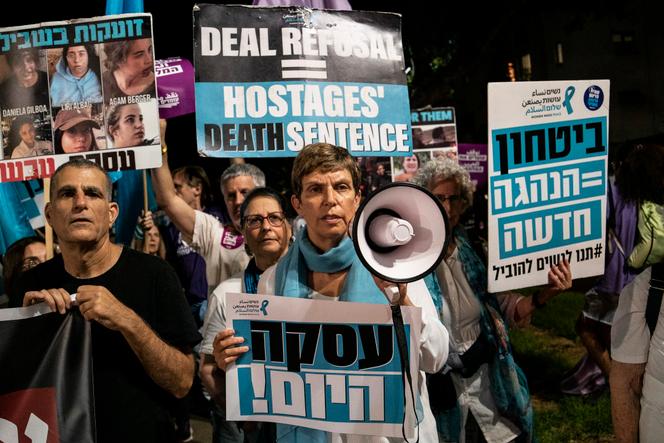
In their offices in Bnei Brak, a religious suburb of Tel Aviv, over a hundred Israeli soldiers have been keeping a macabre tally for the past seven months. Under the authority of Major General Nitzan Alon, in close cooperation with the Military Research and Development and elite military intelligence units, they gather evidence of life and signs that could attest to the deaths of those 124 hostages still held by Hamas after their abduction on October 7.
On Monday, June 3, the Israeli army updated this count once again, announcing the deaths of four hostages, whose bodies remain in Gaza. They are an Israeli and British citizen, Nadav Popplewell, and three octagenarians captured on Kibbutz Nir Oz. One of them, Amiram Cooper, had helped found this farming community in 1955.
This announcement increases the pressure on the Israeli government, which is tearing itself apart over a new ceasefire proposal, which is supposed to see some of the hostages freed. On Monday evening, friends and family of the hostages demonstrated in Jerusalem and Tel Aviv, blocking the expressway that bisects Tel Aviv from north to south. The mother of a hostage still held in Gaza, Einat Zangauker, drew a stark conclusion: “This is the result of military pressure. We’re getting them back dead.”
According to the Israeli army, the four hostages died in Khan Yunis between February and April, as an Israeli division reduced the town, less than 10 kilometers from Nir Oz, to rubble. The soldiers also entered part of the network of tunnels built by Hamas under the buildings. Their officers had little hope of freeing any hostages by force. But they claimed that this pressure would help to force Hamas to free its captives in the context of a ceasefire, which is still some way off. The Israeli army’s investigation is continuing to determine the exact circumstances of these deaths.
In seven months of war, Israel has announced the death of 43 hostages, victims of injuries sustained on October 7 or of their detention conditions, killed by Hamas or by bombardment and fire from the Israeli army. In reality, the toll is even higher. According to Israeli sources, barely half of the 124 captives in Gaza are presumed alive. This is leading a growing number of families to despair of their government, fearing that it will sacrifice their loved ones in order to keep the war going.
Profound differences
“They believed until January, perhaps, in what [Prime Minister Benjamin Netanyahu] told them when he met them. But he can no longer appease them. It’s becoming clear to more and more of them that he’s only interested in his political survival,” said a source close to the Israeli negotiators. In an interview with Time magazine on Tuesday, US President Joe Biden said, without committing himself personally, that these critics had “every reason” to believe that Netanyahu is prolonging the war to stay in power.
You have 52.14% of this article left to read. The rest is for subscribers only.